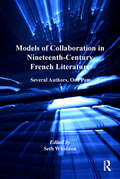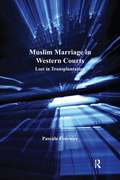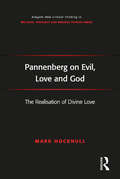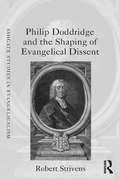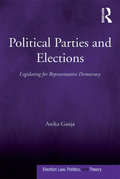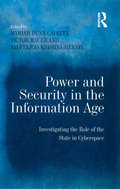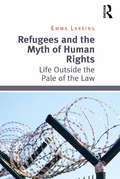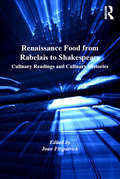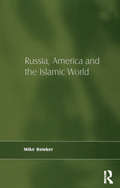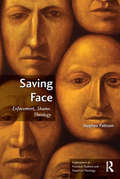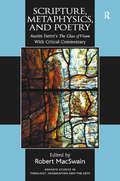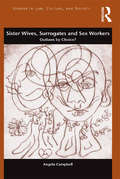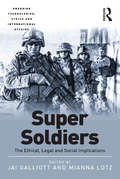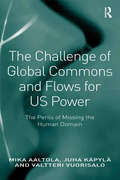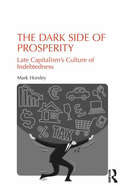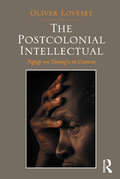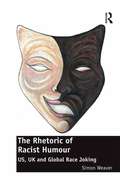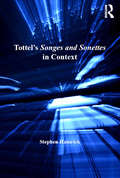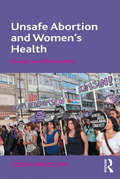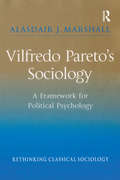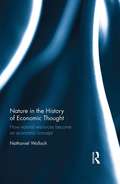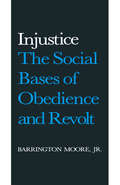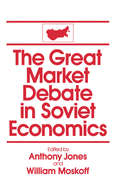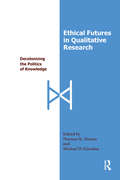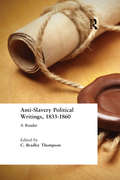Special Collections
Benetech’s Global Certified Accessible Titles
Description: Benetech’s GCA program is the first independent third-party EPUB certification to verify ebook accessibility. By creating content that is born accessible, publishers can meet the needs of all readers. Learn more: https://bornaccessible.benetech.org/
- Table View
- List View
Models of Collaboration in Nineteenth-Century French Literature
by Seth WhiddenContributing to the current lively discussion of collaboration in French letters, this collection raises fundamental questions about the limits and definition of authorship in the context of the nineteenth century's explosion of collaborative ventures. While the model of the stable single author that prevailed during the Romantic period dominates the beginning of the century, the authority of the speaking subject is increasingly in crisis through the century's political and social upheavals. Chapters consider the breakdown of authorial presence across different constructions of authorship, including the numerous cenacles of the Romantic period; collaborative ventures in poetry through the practice of the "Tombeaux" and as seen in the Album zutique; the interplay of text and image through illustrations for literary works; the collective ventures of literary journals; and multi-author prose works by authors such as the Goncourt brothers and Erckmann-Chatrian. Interdisciplinary in scope, these essays form a cohesive investigation of collaboration that extends beyond literature to include journalism and the relationships and tensions between literature and the arts. The volume will interest scholars of nineteenth-century French literature, and more generally, any scholar interested in what's at stake in redefining the role of the French author
Muslim Marriage in Western Courts
by Pascale FournierThis book describes and analyses the notion of Mahr, the Muslim custom whereby the groom has to give a gift to the bride in consideration of the marriage. It explores how Western courts, specifically in Canada, the United States, France, and Germany, have approached and interpreted Mahr. Although the outcomes of the cases provide an illustrative framework for the book, the focus is broader than simply the adjudicative endeavours. The work explores the concept of liberalism, which purportedly champions individuals and individual choice concurrently with freedom and equality. Tensions between and among these concepts, however, inevitably arise. The acknowledgment and exploration of these intertwined tensions forms an important underpinning for the book. Through the analysis of case law from these four countries, this study suggests that transplanting Mahr from Islamic law into a Western courtroom cannot be undone: it immediately becomes rooted in the countries' legal, historical, political, and social backgrounds and flourishes (or fails) in diverse and unexpected ways. Rather than being the concept described by classical Islamic jurists, Mahr is interpreted according to wildly varied legal constructs and concepts such as multiculturalism, fairness, public policy, and gender equality. Moreover, Islamic law travels with a multiplicity of voices, and it is this complex hybridity (a fragmented and disjointed Mahr) which will be mediated through Western law. Returning to the overarching concept of liberalism, the book proposes that distributive consequences rather than recognition occupy central place in the evaluation of the legal options available to Muslim women upon divorce.
Pannenberg on Evil, Love and God
by Mark HocknullPannenberg on Evil, Love and God examines a much-neglected aspect of the theological thought of one of the most original contemporary German theologians, Wolfhart Pannenberg: his theological and philosophical understanding of evil and its relationship to the love of God. The book seeks to correct a widely held misconception that in his theology, Pannenberg has neglected the darker side of the world, concentrating instead on an optimistic picture of the future. This book argues that questions of evil hold a central place throughout Pannenberg’s writing and seeks to draw out the implications of his wrestling with these issues. The Introduction sets the scene by considering the nature of the question of evil and argues that a theological response must be made as part of a global view of the world and not in isolation from other themes. The succeeding chapters develop this theme through a reading of Pannenberg’s theology.
Philip Doddridge and the Shaping of Evangelical Dissent
by Robert StrivensEvangelical Dissent in the early eighteenth century had to address a variety of intellectual challenges. How reliable was the Bible? Was traditional Christian teaching about God, humanity, sin and salvation true? What was the role of reason in the Christian faith? Philip Doddridge (1702-51) pastored a sizeable evangelical congregation in Northampton, England, and ran a training academy for Dissenters which prepared men for pastoral ministry. Philip Doddridge and the Shaping of Evangelical Dissent examines his theology and philosophy in the context of these and other issues of his day and explores the leadership that he provided in evangelical Dissent in the first half of the eighteenth century. Offering a fresh look at Doddridge’s thought, the book provides a criticial examination of the accepted view that Doddridge was influenced in his thinking primarily by Richard Baxter and John Locke. Exploring the influence of other streams of thought, from John Owen and other Puritan writers to Samuel Clarke and Isaac Watts, as well as interaction with contemporaries in Dissent, the book shows Doddridge to be a leader in, and shaper of, an evangelical Dissent which was essentially Calvinistic in its theology, adapted to the contours and culture of its times.
Political Parties and Elections
by Anika GaujaPolitical Parties and Elections presents a comparative analysis of the ways in which advanced industrial democracies seek to regulate the activities of political parties in electoral contests. Actual political practice suggests that parties are crucial actors in democratic elections, yet the nature and extent to which parties are regulated, or even recognized, as participants in the electoral process varies greatly among nations. Author Anika Gauja analyzes the electoral laws of five key common law democracies with similar parliamentary and representative traditions, similar levels of economic and political development, yet with significantly different electoral provisions: the United States, the United Kingdom, Canada, Australia, and New Zealand. Using the relationship between law and politics as a lens, the book focuses specifically on the ways in which these jurisdictions seek to regulate the behavior of their political parties as the product of a broader normative vision of how representative democracy ought to function. In its subject matter, comparative scope, and interdisciplinary theoretical framework, this book examines not only electoral law but also ancillary legislation such as funding regulations, associations and corporations law, and constitutional provisions. It also analyzes the case law that guides the interpretation of this legislation. Political Parties and Elections represents an innovative body of research, comparing for the first time the electoral-legal regimes of a significant number of common law nations.
Power and Security in the Information Age
by Myriam Dunn Cavelty and Victor MauerThe marriage of computers and telecommunications, the global integration of these technologies and their availability at low cost is bringing about a fundamental transformation in the way humans communicate and interact. But however much consensus there may be on the growing importance of information technology today, agreement is far more elusive when it comes to pinning down the impact of this development on security issues. Written by scholars in international relations, this volume focuses on the role of the state in defending against cyber threats and in securing the information age. The manuscript is captivating with the significance and actuality of the issues discussed and the logical, knowledgeable and engaged presentation of the issues. The essays intrigue and provoke with a number of 'fresh' hypotheses, observations and suggestions, and they contribute to mapping the diverse layers, actors, approaches and policies of the cyber security realm.
Refugees and the Myth of Human Rights
by Emma LarkingMost Western liberal democracies are parties to the United Nations Refugees Convention and all are committed to the recognition of basic human rights, but they also spend billions fortifying their borders, detaining unauthorised immigrants, and policing migration. Meanwhile, public debate over the West’s obligations to unauthorised immigrants is passionate, vitriolic, and divisive. Refugees and the Myth of Human Rights combines philosophical, historical, and legal analysis to clarify the key concepts at stake in the debate, and to demonstrate the threat posed by contemporary border regimes to rights protection and the rule of law within liberal democracies. Using the political philosophy of John Locke and Immanuel Kant the book highlights the tension in liberalism between partiality towards one’s compatriots and the universalism of human rights and brings this tension to life through an examination of Hannah Arendt’s account of the rise and decline of the modern nation-state. It provides a novel reading of Arendt’s critique of human rights and her concept of the right to have rights. The book argues that the right to have rights must be secured globally in limited form, but that recognition of its significance should spur expansive changes to border policy within and between liberal states.
Renaissance Food from Rabelais to Shakespeare
by Joan FitzpatrickProviding a unique perspective on a fascinating aspect of early modern culture, this volume focuses on the role of food and diet as represented in the works of a range of European authors, including Shakespeare, from the late medieval period to the mid seventeenth century. The volume is divided into several sections, the first of which is "Eating in Early Modern Europe"; contributors consider cultural formations and cultural contexts for early modern attitudes to food and diet, moving from the more general consideration of European and English manners to the particular consideration of historical attitudes toward specific foodstuffs. The second section is "Early Modern Cookbooks and Recipes," which takes readers into the kitchen and considers the development of the cultural artifact we now recognize as the cookbook, how early modern recipes might "work" today, and whether cookery books specifically aimed at women might have shaped domestic creativity. Part Three, "Food and Feeding in Early Modern Literature" offers analysis of the engagement with food and feeding in key literary European and English texts from the early sixteenth to the early seventeenth century: François Rabelais's Quart livre, Shakespeare's plays, and seventeenth-century dramatic prologues. The essays included in this collection are international and interdisciplinary in their approach; they incorporate the perspectives of historians, cultural commentators, and literary critics who are leaders in the field of food and diet in early modern culture.
Russia, America and the Islamic World
by Mike BowkerDuring the Soviet period, Islam was largely ignored in Moscow and viewed as a bourgeois phenomenon which would fade over time. Nowadays, from the ongoing conflict in Chechnya to recent upheavals in Kyrgyzstan and Uzbekistan, Islamic militancy has become a major security threat to Russia. Mike Bowker examines the newly emerging relationship between Russia and the United States and their struggle against the common threat of international terrorism. He looks at the difficulties of such a relationship by analyzing the lingering mutual suspicion, differing views on the nature of the global terrorist threat and how each side has continued to pursue their own national interests. Students and scholars of international relations and Russian foreign policy will find this book particularly useful.
Saving Face
by Stephen PattisonFaces are all around us and fundamentally shape both everyday experience and our understanding of people. To lose face is to be alienated and experience shame, to be enfaced is to enjoy the fullness of life. In theology as in many other disciplines faces, as both physical phenomena and symbols, have not received the critical, appreciative attention they deserve. This pioneering book explores the nature of face and enfacement, both human and divine. Pattison discusses questions concerning what face is, how important face is in human life and relationships, and how we might understand face, both as a physical phenomenon and as a series of socially-inflected symbols and metaphors about the self and the body. Examining what face means in terms of inclusion and exclusion in contemporary human society and how it is related to shame, Pattison reveals what the experience of people who have difficulties with faces tell us about our society, our understandings of, and our reactions to face. Exploring this ubiquitous yet ignored area of both contemporary human experience and of the Christian theological tradition, Pattison explains how Christian theology understands face, both human and divine, and the insights might it offer to understanding face and enfacement. Does God in any sense have a physically visible face? What is the significance of having an enfaced or faceless God for Christian life and practice? What does the vision of God mean now? If we want to take face and defacing shame seriously, and to get them properly into perspective, we may need to change our theology, thought and practice - changing our ways of thinking about God and about theology.
Scripture, Metaphysics, and Poetry
by Robert MacSwainThis book offers a critical edition of arguably the greatest work of English theology in the 20th century: Austin Farrer's Bampton Lectures published as The Glass of Vision in 1948. Farrer was an interdisciplinary genius who made original contributions to philosophy, theology, and biblical studies, as well as to our understanding of the role of imagination in human thought and Christian doctrine. According to Farrer, the three primary themes of these lectures are 'scripture, metaphysics, and poetry,' individually and in relation to each other. The lectures defend his famous theory of divine revelation through images rather than propositions or events, a provocative account of the place of metaphysical reasoning in theology, and a literary approach to the Biblical text that was decades ahead of its time and is still controversial. The Glass of Vision has generated a rich and interesting interdisciplinary conversation that has lasted for decades, starting with commentators such as Helen Gardner and Frank Kermode. In addition to Farrer's full text, this critical edition also contains an introduction to the significance and context of Farrer's thought, and a selection of thirty-years' worth of commentary by leading British and European theologians and literary scholars: David Brown, Ingolf Dalferth, Hans Haugh, Douglas Hedley, David Jasper, and Gerard Loughlin. Of interest to literary and biblical scholars, theologians, and philosophers, this book holds particular value for those exploring the nature of imagination in contemporary thought and scholarship.
Sister Wives, Surrogates and Sex Workers
by Angela CampbellDid she choose that?’ Or, more normatively, ’Why would she choose that?’ This book critiques and offers an alternative to these questions, which have traditionally framed law and policy discussions circulating around controversial genderized practices. It examines the simplicity and incompleteness of choice-based rhetoric and of presumptions that women’s conduct is shaped, in an absolute way, either by choice or by coercion. This book develops an analytical framework that aims to discern the meaning and value that women may ascribe to morally ambiguous practices. An analysis of law’s approach to polygamy, surrogacy and sex work, particularly in Canada, the United Kingdom and Australia, provides a basis for evaluating the choice-coercion binary and for contemplating alternate modes for assessing, from a law and policy standpoint, the palatability of social practices that appear pernicious to women. Weaving together interdisciplinary research, an innovative analytical framework for assessing choices ostensibly harmful to women, and a critique of the legal rules governing such choices, this book bears relevance for students, scholars, practicing jurists and policymakers seeking a richer understanding of conduct that moves women to the margins of law and society.
Super Soldiers
by Jai Galliott and Mianna LotzThe Spartan City State produced what is probably one of the most iconic and ruthless military forces in recorded history. They believed that military training and education began at birth. Post-World War II saw a shift to army tanks, fighter jets and missiles that would go on to fight the next huge battle in Northern Europe. Today, with the advent of unmanned systems, our hopes are attached to the idea that we can fight our battles with soldiers pressing buttons in distant command centres. However, soldiers must now be highly trained, super strong and have the intelligence and mental capacity to handle the highly complex and dynamic military operating environment. It is only now as we progress into the twenty-first century that we are getting closer to realising the Spartan ideal and creating a soldier that can endure more than ever before. This book provides the first comprehensive and unifying analysis of the moral, legal and social questions concerning military human enhancement, with a view toward developing guidance and policy that may influence real-world decision making.
The Challenge of Global Commons and Flows for US Power
by Mika Aaltola and Juha KäpyläGlobal commons are domains that fall outside the direct jurisdiction of sovereign states - the high seas, air, space, and most recently man-made cyberspace - and thus should be usable by anyone. These domains, even if outside the direct responsibility and governance of sovereign entities, are of crucial interest for the contemporary world order. This book elaborates a practice-based approach to the global commons and flows to examine critically the evolving geopolitical strategy and vision of United States. The study starts with the observation that the nature of US power is evolving increasingly towards the recognition that command over the flows of global interdependence is a central dimension of national power. The study then highlights the emerging security and governance of these flows. In this context, the flows and the underlying global critical infrastructure are emerging as objects of high-level strategic importance. The book pays special attention to one of the least recognized but perhaps most fundamental challenges related to the global commons, namely the conceptual and practical challenge of inter-domain relationships-between maritime, air, space, and cyber-flows that bring about not only opportunities but also new vulnerabilities. These complexities cannot be understood through technological means alone but rather the issues need to be clarified by bringing in the human domain of security.
The Dark Side of Prosperity
by Mark HorsleyThis book offers a critical analysis of consumer credit markets and the growth of outstanding debt, presenting in-depth interview material to explore the phenomenon of mass indebtedness through the life trajectories of self-identified debtors struggling with the pressures of owing money. A rich and original qualitative study of the close relationship between financial capitalism, consumer aspirations, social exclusion and the proliferation of personal indebtedness, The Dark Side of Prosperity examines questions of social identity, subjectivity and consumer motivation in close connection with the socio-cultural ideals of an ’enjoyment society’ that binds the value of the lives of individuals to the endless acquisition and disposal of pecuniary resources and lifestyle symbols. Critically engaging with the work of Giddens, Beck and Bauman, this volume draws on the thought of contemporary philosophers including Zizek, Badiou and Rancière to consider the possibility that the expansion of outstanding consumer credit, despite its many consequences, may be integral to the construction of social identity in a radically indeterminate and increasingly divided society. A ground-breaking work of critical social research this book will appeal to scholars of social theory, contemporary philosophy and political and economic sociology, as well as those with interests in consumer credit and cultures of indebtedness.
The Postcolonial Intellectual
by Oliver LoveseyAddressing a neglected dimension in postcolonial scholarship, Oliver Lovesey examines the figure of the postcolonial intellectual as repeatedly evoked by the fabled troika of Said, Spivak, and Bhabha and by members of the pan-African diaspora such as Cabral, Fanon, and James. Lovesey’s primary focus is NgÅ©gÄ© wa Thiong’o, one of the greatest writers of post-independence Africa. NgÅ©gÄ© continues to be a vibrant cultural agitator and innovator who, in contrast to many other public intellectuals, has participated directly in grassroots cultural renewal, enduring imprisonment and exile as a consequence of his engagement in political action. Lovesey’s comprehensive study concentrates on NgÅ©gÄ©’s non-fictional prose writings, including his largely overlooked early journalism and his most recent autobiographical and theoretical work. He offers a postcolonial critique that acknowledges NgÅ©gÄ©’s complex position as a virtual spokesperson for the oppressed and global conscience who now speaks from a location of privilege. NgÅ©gÄ©’s writings, Lovesey shows, display a seemingly paradoxical consistency in their concerns over nearly five decades at the same time that there have been enormous transformations in his ideology and a shift in his focus from Africa’s holocaust to Africa’s renaissance. Lovesey argues that NgÅ©gÄ©’s view of the intellectual has shifted from an alienated, nearly neocolonial stance to a position that allows him to celebrate intellectual activism and a return to the model of the oral vernacular intellectual even as he challenges other global intellectuals. Tracing the development of this notion of the postcolonial intellectual, Lovesey argues for NgÅ©gÄ©’s rightful position as a major postcolonial theorist who helped establish postcolonial studies.
The Rhetoric of Racist Humour
by Simon WeaverIn today's multicultural and multireligious societies, humour and comedy often become the focus of controversy over alleged racist or offensive content, as shown, for instance, by the intense debate of Sacha Baron Cohen's characters Ali G and Borat, and the Prophet Muhammad cartoons published in the Danish newspaper Jyllands-Posten. Despite these intense debates, commentary on humour in the academy lacks a clear way of connecting the serious and the humorous, and a clear way of accounting for the serious impact of comic language. The absence of a developed 'serious' vocabulary with which to judge the humorous tends to encourage polarized debates, which fail to account for the paradoxes of humour. This book draws on the social theory of Zygmunt Baumann to examine the linguistic structure of humour, arguing that, as a form of language similar to metaphor, it is both unstable and unpredictable, and structurally prone to act rhetorically; that is, to be convincing. Deconstructing the dominant form of racism aimed at black people in the US, and that aimed at Asians in the UK, The Rhetoric of Racist Humour shows how racist humour expresses and supports racial stereotypes in the US and UK, while also exploring the forms of resistance presented by the humour of Black and Asian comedians to such stereotypes. An engaging exploration of modern, late modern and fluid or postmodern forms of humour, this book will be of interest to sociologists and scholars of cultural and media studies, as well as those working in the fields of race and ethnicity, humour and cultural theory.
Tottel's Songes and Sonettes in Context
by Stephen HamrickThough printer Richard Tottel’s Songes and Sonettes (1557) remains the most influential poetic collection printed in the sixteenth century, the compiliation has long been ignored or misundertood by scholars of early modern English culture. Embracing a broad range of critical and historical perspectives, the eight essays within this volume offer the first sustained analysis of the many ways that consumers read and understood Songes and Sonettes as an anthology over the course of the early modern period. Copied by a monarch, set to music, sung, carried overseas, studied, appropriated, rejected, edited by consumers, transferred to manuscript, and gifted by Shakespeare, this muti-author verse anthology of 280 poems transformed sixteenth-century English language and culture. With at least eleven printings before the end of Elizabeth I’s reign, Tottel’s ground-breaking text greatly influenced the poetic publications that followed, including individual and multi-author miscellanies. Contributors to this essay collection explore how, in addition to offering a radically new kind of English verse, ’Tottel’s Miscellany’ engaged politics, friendship, religion, sexuality, gender, morality and commerce in complex-and at times, contradictory-ways.
Unsafe Abortion and Women's Health
by Colin FrancomeUnsafe abortion remains one of the most neglected sexual and reproductive health problems according to the World Health Organisation. In recent years it has been estimated that nearly 44 million abortions occur annually leading to around 47,000 deaths. At this rate a woman will die of an unsafe abortion every 11 minutes. Bringing together a wealth of information from around the world, this book argues that the time has come for a great change in legislation, advocating a shift towards the legalization of abortion to improve the health of women in poorer countries. With attention to circumstances in each of the major continental regions, an outline of the global situation is provided to reveal the major trends in the provision and procurement of abortion, as well their effects. Presenting data drawn from over a hundred countries covering over ninety per cent of the world’s population, based on published statistical information, changes to legal frameworks, court cases and the accounts of local commentators and activists, Unsafe Abortion and Women's Health will be of interest to scholars and students of the sociology of medicine, gender and reproductive health, social and health policy and feminist studies.
Vilfredo Pareto’s Sociology
by Alasdair J. MarshallVilfredo Pareto is a key figure in the history of economics and sociology. His sociological works attempted to merge these two disciplines through a psychologistic analysis of society, economy and politics. This is the first book to rethink Pareto's contribution to classical sociology by focusing upon its psychological underpinning. The author locates the origins of Pareto's psychologistic approach both within the history of Italian thought and within Pareto's own experiences of business and politics. He evaluates Pareto's sociology through the lens of contemporary social science, examining whether its explanatory power is growing rather than diminishing as levels of social and epistemological complexity rise. The volume also explores Pareto's assumptions about personality through the lens of contemporary psychology. It concludes with a psychometric study of Westminster MPs which clarifies and attests to Pareto's contemporary relevance, and indicates that even practitioners of politics may gain much from reading Pareto.
Nature in the History of Economic Thought
by Nathaniel WollochFrom antiquity to our own time those interested in political economy have with almost no exceptions regarded the natural physical environment as a resource meant for human use. Focusing on the period 1600-1850, and paying particular attention to major figures including Adam Smith, T.R. Malthus, David Ricardo and J.S. Mill, this book provides a detailed overview of the intellectual history of the economic consideration of nature from antiquity to modern times. It shows how even someone like Mill, who was clearly influenced by romantic notions regarding the spiritual need for contact with pristine nature, ultimately regarded it as an economic resource. Building on existing scholarship, this study demonstrates how the rise of modern sensitivity to nature, from the late eighteenth century in particular, was in fact a dialectical reaction to the growing distance of modern urban civilization from the natural environment. As such, the book offers an unprecedentedly detailed overview of the intellectual history of economic considerations of nature, whilst underlining how the history of this topic has been remarkably consistent.
Injustice
by Barrington Moore, JrFirst Published in 1978. Routledge is an imprint of Taylor & Francis, an Informa company.
The Great Market Debate in Soviet Economics
by David M Jones and William MoskoffThe most agonizing and protracted of all the Soviet reform debates has been the debate over economic reform. This anthology of essays and roundtables from party, professional and literary journals surveys the key issues in the market debate.
Ethical Futures in Qualitative Research
by Norman K. Denzin and Michael D. GiardinaEthics has been a perennial concern of qualitative researchers. The subject has been confounded with the emergence of human subjects regulations, the increased concern with indigenous communities, the globalization of research practices, and the breakdown of barriers between researcher and subject. The original contributions to this volume highlight the key topics that face contemporary qualitative researchers and those that will likely emerge in the near future. Written by many of the leading figures in the field—Lincoln, Denzin, Schwandt, Richardson, Ellis, Bochner, Morse, among others—this book will help shape the ethical response of the field to the challenges presented by the contemporary research environment.
Anti-Slavery Political Writings, 1833-1860
by C. Bradley ThompsonThe abolitionist movement in 19th century America led directly to the end of slavery in the United States. This collection of more than 20 original documents including speeches, editorials, books and fiction, captures the deep ideological divisions within the abolitionist movement.
